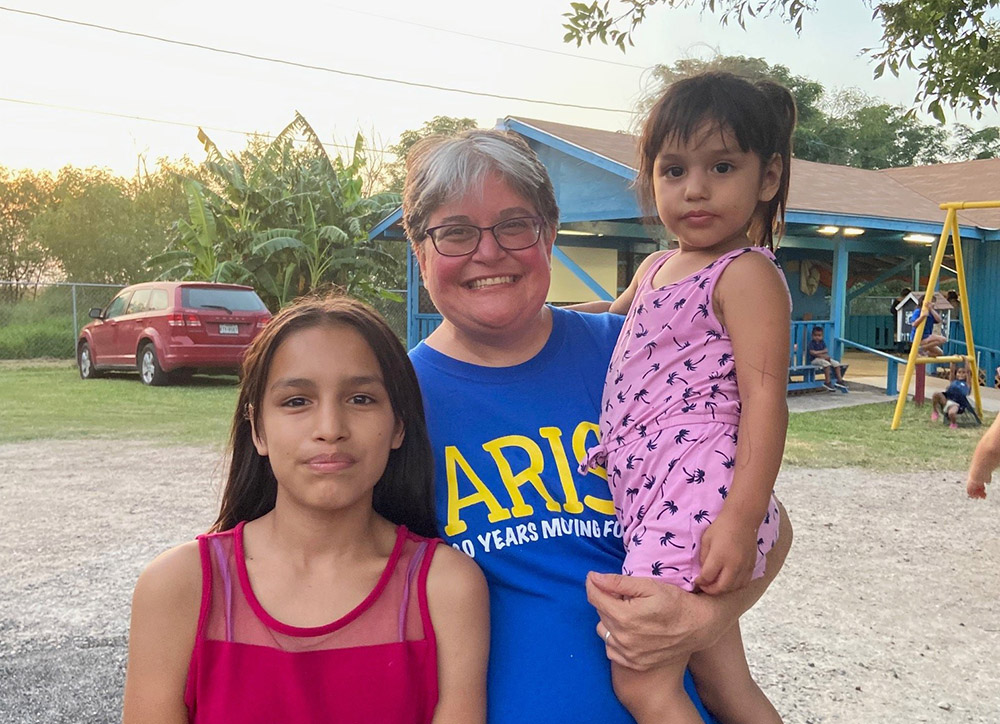
Mercy Sr. Jennifer Wilson and children from the Arise Adelante summer program (Theresa Saetta)
The young girl stopped and looked up at me. She said, "Sister, I need to tell you a secret."
I gently told her that secrets are not nice because they can make others feel like they are not a part of the group.
She looked at me with these big eyes filled with annoyance. She said, "Sister, I don't want to be rude to the other teachers, so here is my secret: I think you are the best teacher here."
I smiled at the little girl, laughing to myself with delight in her innocence. Later, I started to think about what she said. At that moment, she felt I was the best teacher. This happened because I entered into her world. I asked her what she liked to do, played with her, and made her feel important.
She did not care that I didn't speak Spanish, that I didn't live in Texas, that I was a lot older than her, and that I was a different color. She had all the information she needed, and that was that I cared about her.
I met that little girl because I was spending time at AriseAdelante. My experiences visiting there on two different occasions made me curious about the following question. Who do we invite?
This question is related to my ministry on one level. I am a vocation minister with the Sisters of Mercy. This means I invite others to consider becoming a sister. I accompany them through the process of joining the sisters.
Most Sisters of Mercy are older white women. This is not the whole of our community, but it is a large percentage. I have been thinking for a while about this question: How do we extend the circle beyond a majority group that is white and older? Does it really matter, and why do I feel so passionate about doing so?
On one level, I know that difference is what makes us each unique. I know it is important and understand its value. I also know the energy, vulnerability and risk it takes to enter into a genuine relationship with someone who is not similar to me.
As I reflected on this, I started to think about the disciples on the road to Emmaus. What if they had ignored the stranger and been too involved in their conversation to respond? What if the stranger made them too uncomfortable, was too hard to understand, or they just didn't have the time? They would have literally missed Jesus.
Thinking about it this way leads me to think about being compassionate, loving and understanding.
Advertisement
Then, some other thoughts come in, and they involve me thinking about how I welcome others and wondering if I really have the time for that. This stops me in my tracks because Jesus has time for us always. We are all loved in God's eyes.
However, we have sometimes been conditioned not to celebrate differences, to seek out and invite only those like us into our lives. I think we have all done this, regardless of whether we are part of a religious community, a soccer team, a book club or whatever else.
Fast-forward to a few days ago when I was preparing something for a picnic, and three sisters from Vietnam whom I live with were helping me. We had so much fun laughing and working together: four people, four first languages, and many differences.
The differences in the living of every day can be overwhelming at times. We have different cultural understandings of cleanliness, prayer, money and everything else. None of us do anything the same way, and misunderstandings happen often.
The day before the picnic, I sat down to dinner and was initially frustrated. I didn't know what was on my plate, and I had a different plan for how my evening would go. We hadn't planned on having dinner together, but there the dinner was.
A conversation started about how the day went, and someone started explaining a problem they had. We started talking, really talking, and understanding happened. We talked and listened, and I left the dinner table with a different experience and gratitude for each of them that I did not have before.
There is comfort in familiarity, in people who think like us, look like us and speak our birth language. This takes me back to my earlier question about who we invite. Inviting others who are different into our lives involves taking risks. How you or your family or the Sisters of Mercy do this doesn't matter. It only matters that we do.
Could you consider inviting a refugee family over for Thanksgiving? Perhaps you could ask that annoying neighbor over for dinner.
The little girl I met in Texas and the sisters I live with reminded me that I am surprised by the encounter whenever I risk inviting and truly seeing the other. Doing this is one more way to welcome Jesus into my life.
It mattered to the disciples on the road to Emmaus. What they would have missed if they had not welcomed that stranger! It should matter to each of us that our lives reflect the richness of God's community.







